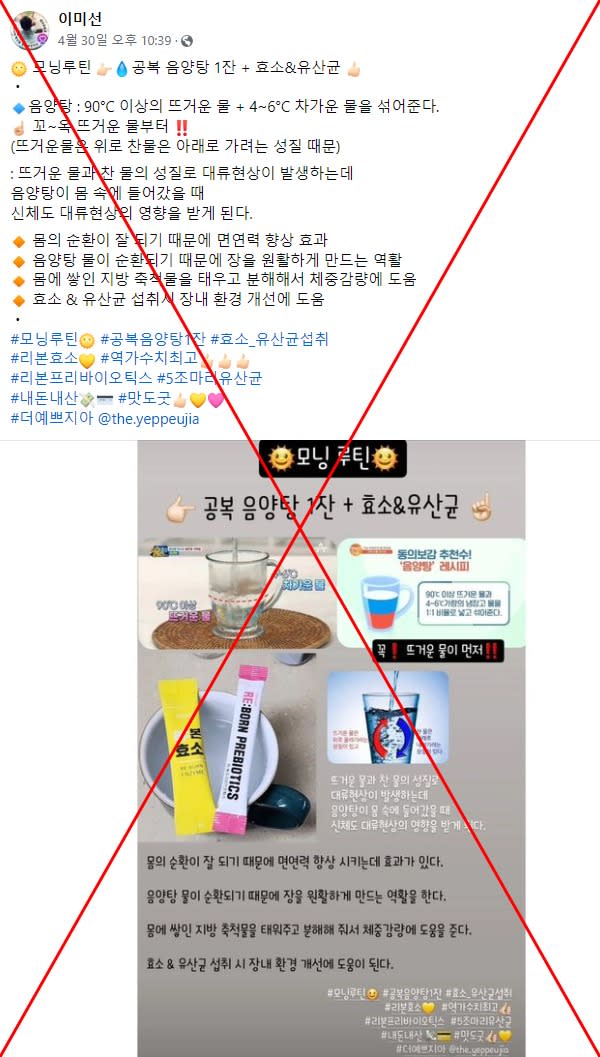Doctors dismiss posts touting hot and cold water mixture for 'weight loss and dementia prevention'
Doctors trained in Western and traditional Korean medicine have refuted Korean-language posts that claimed drinking a mixture of hot and cold water each morning can lead to weight loss, cure insomnia and prevent dementia, saying they were not scientifically substantiated. The misleading posts cited an ancient encyclopaedia of Eastern medicine compiled during the 17th century, however, AFP found the book made no such direct claims.
A Korean-language Facebook post published on April 30 recommended mixing hot water over 90 degrees Celsius with cold water -- around 4C to 6C -- for a daily weight loss drink called "Yin Yang Decoction".
Emphasising "the hot water must be added first", the post claimed the resulting convection -- the movement within a fluid where hot water rises to the surface and cold water falls -- "boosts immunity" and "aids weight loss by burning and breaking down fat".
"Morning routine: a cup of Yin Yang Decoction on an empty stomach," read the post. "Donguibogam recommends this water," read the text in the attached image.
Donguibogam, which translates as "Treasured Paragon of Eastern Medicine", is an encyclopaedia of medical knowledge and treatment techniques compiled in Korea during the Joseon Dynasty (archived link).
It was written by the royal physician Heo Jun with the collective support of medical experts and literati and published in 1613 (archived here and here).

Similar misleading posts have circulated across platforms, including Instagram, YouTube and Naver Blog, especially after a South Korean actress was seen drinking Yin Yang Decoction on a TV show (archived link).
As well as weight loss, the posts suggested the drink could be beneficial for preventing dementia and curing insomnia.
However, doctors have told AFP that the claims in the posts are unsubstantiated.
'No scientific evidence'
Doctor Jung Jin-sup, a former professor of physiology at Pusan National University School of Medicine and trained in Western medicine, said the posts were misleading (archived here and here).
"The claim has no scientific evidence," he said. "It seems to me that it is a claim that cannot be concluded through experiments or supported by scientific evidence."
Jung, who also served as the director of the university's Medical Research Institute, told AFP on May 8 that it seemed "almost impossible to design an experiment that could provide scientific data to prove the effects".
When asked about the potential benefits of Yin Yang Decoction, he said it could help prevent dehydration.
Korean medicine doctor Park Seong-ha, former dean of the Graduate School of Korean Medicine at Pusan National University, said the effects of drinking Yin Yang Decoction have not been verified scientifically (archived link).
"The claim that Yin Yang Decoction is effective for weight loss, insomnia treatment and dementia prevention is not explained by Donguibogam and requires scientific verification," he said.
"When making such claims, it is necessary to demonstrate the difference in results between the experimental group and the control group when the fluid is administered to individuals with the same illness.
"In modern-day Korean medicine, prescriptions are based on such verification."
AFP found the Donguibogam mentioned the Yin Yang Decoction at least six times in its 25 volumes, but only as a treatment for digestion problems (archived link)
The book does not state the drink offers the health benefits the posts claim, such as facilitating weight loss, boosting immunity, curing insomnia or even preventing Alzheimer's.
